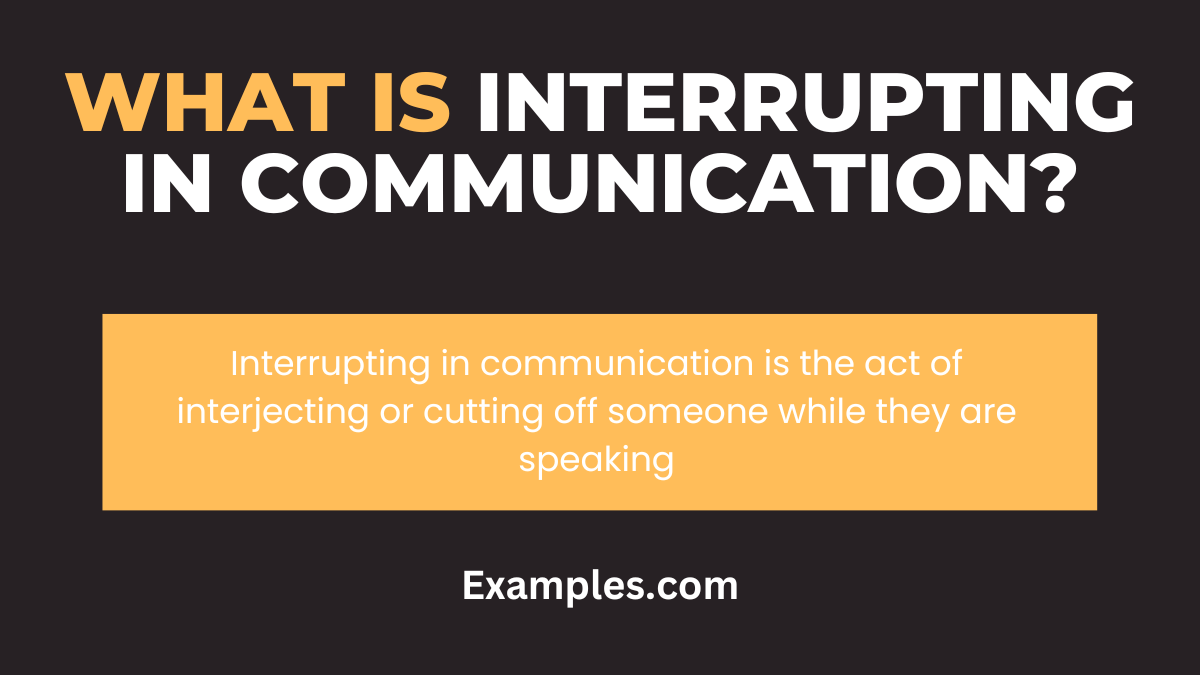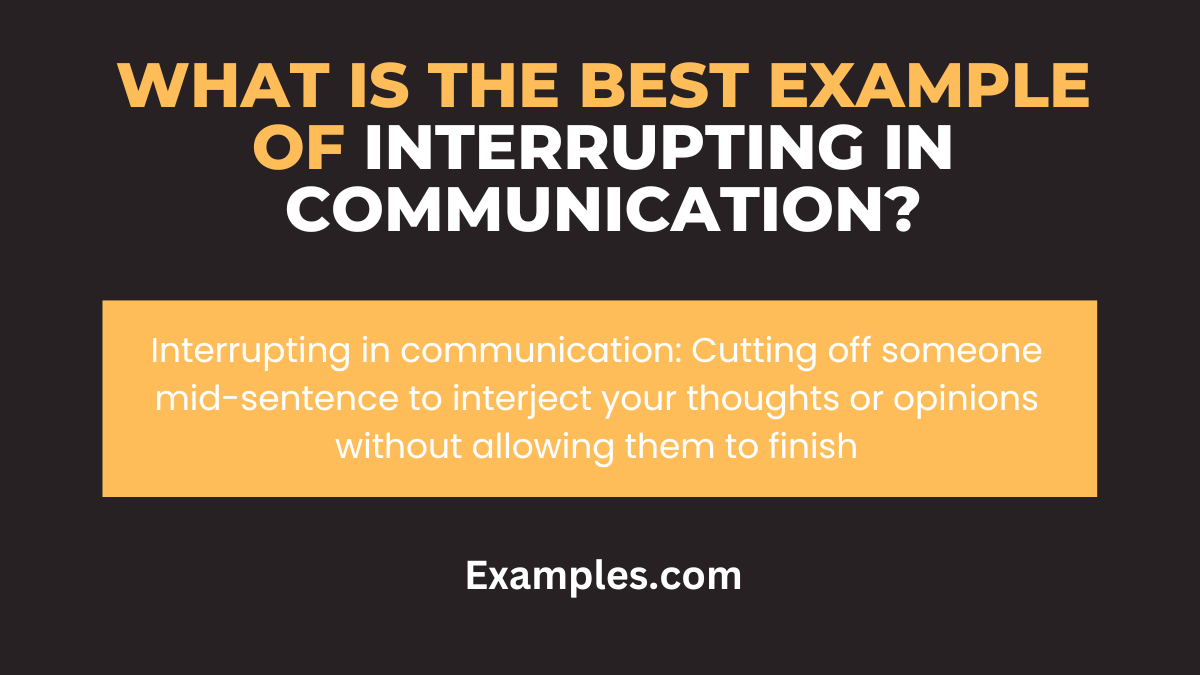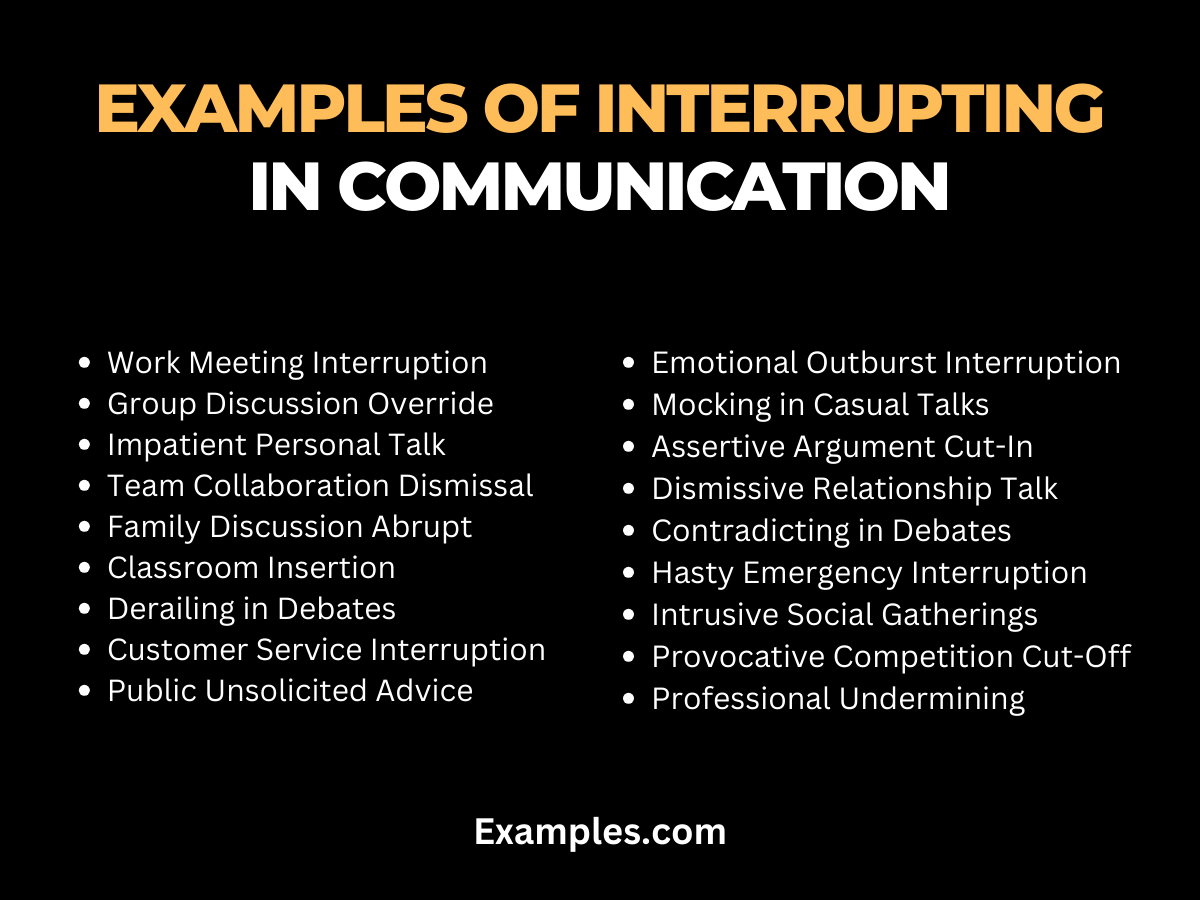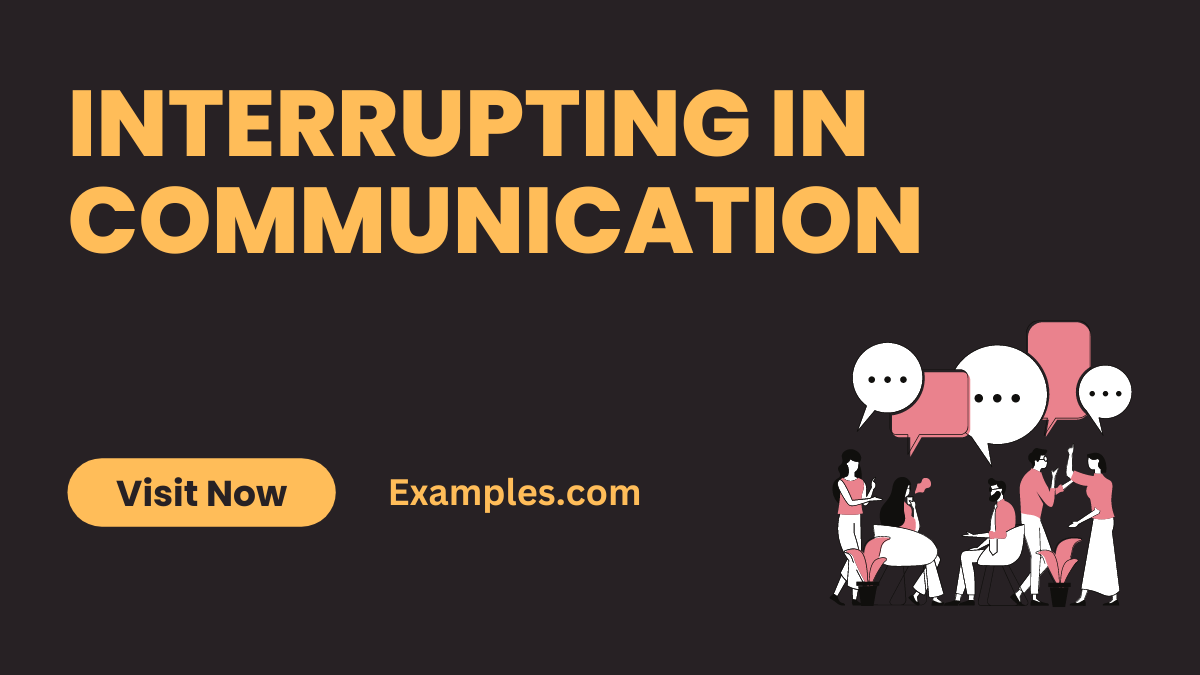19+ Interrupting in Communication Examples
In the realm of effective communication, mastering the art of interruption can be a game-changer. ‘Interrupting in Communication’ is not just about cutting someone off; it’s a strategic tool for steering conversations, clarifying points, and injecting fresh perspectives. This guide delves into the nuances of interruption, offering a rich blend of tips, techniques, and insights. Learn to interrupt with purpose and politeness, turning potentially disruptive moments into opportunities for engaging and productive dialogue.
What is Interrupting in Communication?

Interrupting in communication refers to the act of breaking the flow of someone else’s speech. It’s a delicate balance between contributing to the conversation and respecting the speaker. Understanding when and how to interrupt can significantly enhance the quality of interactions, making them more dynamic and collaborative.
What is the Best Example of Interrupting in Communication?

A classic example of interrupting in communication is during a heated debate. Here, participants may interrupt to clarify a point, offer a counter-argument, or steer the conversation in a new direction. Done correctly, these interruptions can enrich the discussion, bringing in diverse viewpoints and fostering a deeper understanding of the topic.
20 Examples of Interrupting in Communication

Interrupting in communication, often a facet of Aggressive Communication, can derail conversations and lead to misunderstandings. This article delves into 20 examples of interruption, a key characteristic of aggressive communication styles like verbal attacks and impatient responses. These examples highlight the disruptive nature of interruption in various contexts, including workplace, personal relationships, and public interactions, underscoring the importance of mindful and respectful communication practices.
- Cutting Off in a Work Meeting: Interrupting a colleague’s presentation with your own opinion. “But I think my approach is better.”
- Overriding in a Group Discussion: Speaking over someone in a group to dominate the conversation. “Let me tell you the right way to do this.”
- Impatient Interruption in Personal Conversations: Hastily interrupting a friend sharing a personal story. “That’s nothing, listen to what happened to me.”
- Dismissing in Team Collaboration: Interrupting a team member’s idea before they finish. “That won’t work, let’s move on.”
- Abrupt Interjection in Family Talks: Cutting off a family member mid-sentence during a discussion. “No, you’re wrong about that.”
- Forceful Insertion in Classroom Discussions: Interrupting a classmate’s answer with your own. “Actually, the correct answer is…”
- Derailing in Debates: Interrupting an opponent to throw them off track. “Wait, that’s not accurate, here’s the truth.”
- Commanding Interruption in Workplace: Overriding a subordinate’s explanation in a meeting. “Stop, I’ll take over from here.”
- Interruption in Customer Service: Cutting off a customer while they explain an issue. “I know what you’re going to say, here’s the solution.”
- Unsolicited Interference in Public Settings: Interrupting strangers in public to give unsolicited advice. “You’re doing that all wrong.”
- Impulsive Outburst in Emotional Conversations: Interrupting during an emotional exchange to express your feelings. “But what about how I feel?”
- Mocking Interruption in Casual Talks: Interrupting with sarcasm to belittle someone’s point. “Oh sure, like that’s going to happen.”
- Assertive Cutting In During Arguments: Forcefully interrupting during an argument to make your point. “Listen to me now!”
- Dismissive Interjection in Relationship Discussions: Interrupting your partner dismissively in a conversation. “That’s not important, listen to this.”
- Authoritative Interruption in Instructional Settings: Interrupting a learner’s question with a commanding tone. “You don’t need to know that.”
- Contradicting in Intellectual Debates: Cutting off to contradict in a scholarly discussion. “That’s completely wrong, the fact is…”
- Hasty Interruption in Emergency Situations: Interrupting in a crisis to quickly give directions. “Stop talking, do this now!”
- Intrusive Interjection in Social Gatherings: Interjecting abruptly in social settings to change the subject. “Enough about that, let’s talk about something else.”
- Provocative Interruption in Competitive Scenarios: Interrupting to provoke or challenge in a competition. “That’s not all, here’s my challenge to you.”
- Undermining in Professional Exchanges: Interrupting a professional peer to undermine their expertise. “Actually, I have more experience in this.”
What is the Psychology Behind Interrupting Communication?
- Desire for Dominance: Interrupting often reflects a person’s need to dominate a conversation, showcasing a desire for control.
- Impatience: Some individuals interrupt due to a lack of patience, unable to wait for their turn to speak.
- Anxiety: People with anxiety might interrupt as they fear forgetting their thoughts if they wait.
- Attention-Seeking Behavior: Interruption can be a way to draw attention to oneself in a conversation.
- Lack of Awareness: Sometimes, individuals aren’t aware of their interruptive behavior.
- Cultural Differences: In some cultures, interrupting is a normal part of enthusiastic communication.
- Eagerness to Contribute: Overeagerness to contribute ideas can lead to interrupting others.
- Aggressive Communication Style: Interrupting can be a part of an aggressive communication style, indicating hostility or assertiveness.
Types of Interrupting in Communication
- Verbal Overlapping: Interrupting someone while they are still speaking.
- Topic Hijacking: Shifting the conversation to a different topic abruptly.
- Corrective Interruption: Interrupting to correct someone’s statement.
- Dominating Interruption: Continuously interrupting to dominate the conversation.
- Impulsive Interruption: Cutting in impulsively without considering the speaker’s feelings.
- Competitive Interruption: Interrupting in a bid to outshine or compete with the speaker.
- Anxious Interruption: Interrupting due to anxiety or nervousness.
- Empathic Interruption: Interrupting out of empathy, often to offer comfort or agreement.
How to Avoid Interrupting in Communication
- Practice Active Listening: Focus on listening actively to understand, not just to respond.
- Be Mindful: Be aware of your conversation habits and consciously avoid interrupting.
- Wait for a Pause: Only speak when there’s a natural pause in the conversation.
- Use Non-Verbal Cues: Nod or use facial expressions to show engagement without interrupting.
- Manage Anxiety: If anxiety causes interruption, work on managing it through relaxation techniques.
- Respect Differences: Acknowledge and respect cultural differences in communication styles.
- Self-Reflection: Regularly reflect on your communication style and make improvements.
- Seek Feedback: Ask for feedback from others about your conversational habits and adjust accordingly.
Effects of Interrupting in Communication
- Breakdown of Understanding: Constant interruptions can lead to misunderstandings.
- Frustration and Resentment: Being interrupted can cause frustration and resentment in the speaker.
- Reduced Self-Esteem: Frequent interruption can lead to diminished self-esteem in the person being interrupted.
- Conflict Escalation: Interrupting can escalate conflicts and lead to aggressive communication.
- Impaired Relationship Building: It can hinder the development of healthy relationships.
- Loss of Important Information: Interrupting might cause missing out on key information.
- Decreased Productivity: In a group setting, interruptions can lead to decreased productivity.
- Perception of Rudeness: Constant interruption can be perceived as rude or disrespectful.
The impact of interrupting in communication is crucial for effective discourse. This article has provided valuable insights and tips to enhance communication etiquette. Remember that active listening and allowing others to speak without interruption fosters better understanding and more productive conversations. Practicing patience and respect in your interactions will lead to more harmonious and meaningful communication.



